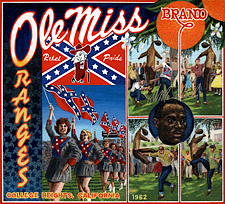
Firstly, I really enjoyed reading this essay and gaining some insight from a native Indian perspective. Especially as Texans, it is very important to read articles like this since it addresses issues that are right in our own backyard literally. There were some points I found myself agreeing with Silko on and others that I did not necessarily disagree with but feel that they should definitely be changed. I completely agreed with here on the unnecessary roughness and racial prejudice that the Border Patrol Men enforce. I personally have never been farther south than San Antonio but I could still greatly identify with what Silko experienced at the hands of the officers. My family and I were on our way to my uncle’s house in a very affluent neighborhood in Dallas when we were pulled over by the police. We were driving our somewhat brand new SUV and the passengers consisted of me, my parents, and my older sister. We were goofily dressed for the holiday occasion in matching sweaters, so when the officer asked my father to get out of the car and began shining his bright flashlight into the faces of my preteen sister and mother, I felt so confused. We weren’t aware of having committed any kind of driving violation and we certainly didn’t seem suspicious in any way (except maybe for our tacky Christmas attire), nonetheless, the officer searched my father and kept us pulled over on the side of the road for nearly an hour. When the officer finally ventured back to the car for the final time, he said that he had pulled us over because one of the lights that shined on our rear license plate had gone out. When I read this article, I felt just as Silko did, like we were in violation of some law for being somewhere we didn’t belong, according to law. At the same time, being a born and bread Texan and a very patriotic American citizen, I have been practically programmed to fear and have hatred of the “illegal aliens” who are “intruding” on my freedoms. At times, I feel like it is so wrong for those sneaky people to be creeping over the border in the middle of the night carrying their disastrously addictive drugs and criminal ways into my beautiful country. But then I imagine the little Indian girl clinging to her mothers hand as she and her poor family runaway from disparity and governmental injustices to the safe haven of our borders. When Silko describes the image of the passengers allover the train heading north I slightly disagree with her describing it as an image of beauty. What I feel would be beautiful is if the foreigners with intentions for good( not the drug smugglers) would come to America and become a legal citizen so that they may pay taxes and not only function but also contribute to the betterment of the American society.










